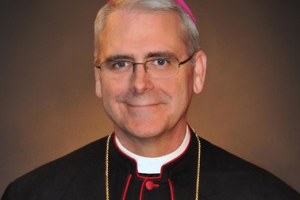I am ready for Lent this year. Please don’t misunderstand me. The spirit is willing, but the flesh is weak. Something within always resists Ash Wednesday’s sober call to repentance and a reorientation of my life. But, after facing the challenges of the pandemic this year, I admit that business as usual has not been a reliable way forward. Change has been thrust upon us. How can we make the most of these challenges?
The Church, rooted in the Gospel, proposes the threefold discipline of prayer, fasting and almsgiving to guide us through this holy season. The disciplines of Lent are directed toward renewal. Lent is the season that calls us to repentance and ongoing conversion more insistently than any other. Now is the time to prepare ourselves with the whole Church for the celebration and experience of new life at Easter.
On Ash Wednesday, we are exhorted to repent and believe in the Gospel. What exactly are we exhorted to believe? The Gospel proclaims that God loves each of us and has a plan for our lives. It acknowledges what experience confirms, that sin has interfered with God’s plan and made a mess of things. It affirms that Jesus Christ died and rose victorious for you and for me. We only will share the joy of his victory if we acknowledge our sinfulness and need for a savior. Lent puts us in touch with that deep spiritual need and hunger.
A deeper conversion to Christ
If we truly are seeking a deeper conversion to Christ and desire to live as his disciples, it seems strange that we usually take on penances and disciplines during Lent simply to discard them at Easter. Unfortunately, that is often the way we approach this penitential season.
Discipleship is a lifelong journey and year-round way of life. The most fruitful Lenten disciplines help us focus on those areas of life in which the Lord is calling us to deeper conversion and repentance. In other words, it is not primarily about what legitimate pleasure we are willing to “give up” during Lent, but about what sin in our life do we need to repent of so that we can follow Christ more faithfully. What obstacles need to be removed? What relationships need to be repaired, healed or ended? What bad habits need to be broken? What virtues (good habits) need to be strengthened? Our acts of fasting, almsgiving and our prayer open our hearts to God’s grace so that we can follow Christ more closely and make lasting and life-giving changes.
Most Catholics still recognize the importance of a good confession during Lent. It is how we prepare ourselves for a fruitful  celebration of Easter. We humbly confess our sinfulness seeking divine mercy and we experience the liberating grace of reconciliation with God and his Church.
celebration of Easter. We humbly confess our sinfulness seeking divine mercy and we experience the liberating grace of reconciliation with God and his Church.
Unfortunately, far too many Catholics approach the Sacrament of Penance only during Lent. If it really is so beneficial, why would we approach it so infrequently?
The grace of Lent is an invitation to make permanent changes in our lives. How about changing our attitude toward the Sacrament of Penance? Beginning this Lent, I invite us all to approach this great sacrament of mercy more frequently. Without the grace and healing that comes to us through the Sacrament of Penance, how can we experience the mercy and deeper conversion the Lord desires for us?
Saint John Vianney, the patron saint of priests, recognized the importance of this sacrament for the renewal of his parish. He spent untold hours hearing confessions because he saw this great gift, which was being neglected in his time just as it is in our own, as the key that would free his people from their bondage to sin and lead them to great holiness.
By preaching its importance, praying for his parishioners’ conversion, and making himself available in the confessional, he eventually witnessed the fruits of a great spiritual renewal in his parish. The renewal began with the Sacrament of Penance, which helped people experience God’s great mercy and opened their hearts to the fruitful reception of the Eucharist and an eagerness for the works of charity.
“It is beautiful to think that we have a sacrament that heals the wounds of our souls,” exclaimed Saint John Vianney.
Why would we not go frequently to receive the benefits of this great sacrament? Each of us longs for the profound experience of freedom and peace that comes from a clear conscience and being released from our bondage to sin. Saint John Vianney describes the effects of this sacrament in just those terms: “The Good God at the moment of absolution throws our sins behind his shoulders; in other words, he forgets them; he destroys them; they will never reappear again.”
This Lent take the longer view. Recognize the need for real changes and ongoing conversion. A commitment to the frequent celebration of the Sacrament of Penance will transform that hoped-for outcome from a mere wish into reality.
————————
Archbishop Paul S. Coakley heads the Archdiocese of Oklahoma City.



You must be logged in to post a comment.